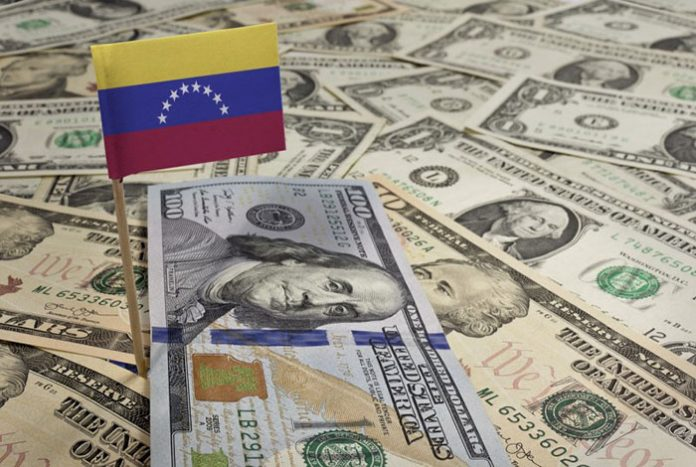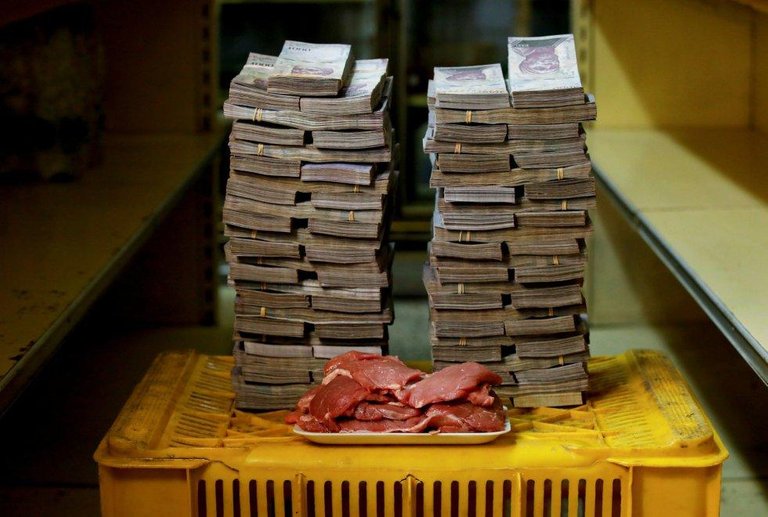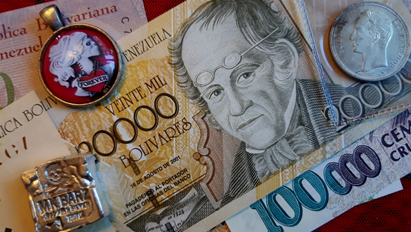According to a report from the Central Bank of Venezuela (BCV), the net international reserves of the Republic, as of September 10, registered a balance of US $ 6.322 million, which reflects a decrease of US $ -103.0 million, compared to the balance for the previous week, which was US $ 6,425 million.
Source
With these critical levels of monetary support, any amount of Bolívares issued by the BCV, whether physically or electronically, only represents inorganic money, which increases circulating liquidity, causing immediate devaluation.
The Venezuelan government, as a populist and demagogic measure, has been implementing for years a system of payment of "Presidential Bonds" to a large part of the population (10 million people approx) through a digital system called "Patria ". These payments are made in national currency.
Since on December 6/2020, a new electoral process will take place in Venezuela, the national government (as a measure of coercion and deception) has increased the delivery of these presidential bonds, which is having a direct impact on the price of the national currency and in counterpart to the price of the dollar, the latter has experienced an increase of more than 60% of its price in 15 days.
The Dollar in Venezuela
The value of the dollar in Venezuela has lagged substantially with respect to the value of actives and services whose prices are established in Bolívares, which allows it to be perceived as "artificially cheap" and thus its price rises, since, As there is a greater amount of bolivars in the financial apparatus, due to the payment of year-end bonds, liquidation of labor liabilities and even the payment of "presidential bonds", there is a considerable increase in the demand for American currency, due to the "momentary" purchasing power.
Since in Venezuela there is a great shortage of dollars, due to the exchange control established by the government for more than 20 years, the supply does not cover the levels of demand, causing an immediate upward effect on the exchange rate.
Many people mistakenly use the term "devaluation of the dollar", but this phenomenon cannot be considered as such since the inflation of this currency occurs because the reference to fix its value is still the Bolivar.
"Prices increase in dollars due to their cost established in Bolívares."
For this reason, currently, it takes twice the amount to be able to buy the same thing that was bought months ago with 1 dollar.
Let's see in concrete examples:
11/15/2020: 1Usd = 540,000.00 Bs
1Kg of Flour had a cost of 0.8USD, that is, 432,000.00 Bs,
1Kg of Meat had a cost of 2.5USD, that is, 1,350,000.00 Bs.
Today (22/11/2020): 1Usd = 870,000.00 Bs
(870,000.00Bs-540,000.00Bs = 330,000.00 ==> 61% increase.)
But nevertheless:
1 Kg of Flour now costs 1.2USD, that is, 1,044,000.00 Bs. (141% increase)
1Kg of Beef now costs 4USD, that is, 3,480,000.00 Bs. (204% increase)
Note: these increases occurred within 15 days. The trend is that the $/Bs exchange rate will continue to increase in the next few hours.
How to Protect Ourself from Devaluation?
For the companies
The accumulation of inventory, raw materials, and intermediate actives could be an effective measure.
For example, a technology company might preserve the durability of its electronic equipment. This would work in the short term as they would have to deal with technological outdated.
For Merchants
The accumulation of final actives could work since the price of products can be adjusted according to inflation and not the dollar.
Although this measure cannot be applied to perishable products or food. Especially the latter cannot be hoarded, since then the merchant could be seen as a "criminal" and would be stripped of his assets, even legally imputed and imprisoned. This is due to policies established by the national government.
For the People
One of the traditional ways would be the acquisition of real estate (apartments, houses, or land), as well as precious materials (gold, silver).
Cryptocurrencies have become a great "lifesaver" for many Venezuelan citizens since keeping the assets in the form of cryptos is an effective method to protect them from devaluation.
Unfortunately, the vast majority of Venezuelans can only accumulate very little Cryptography, since basic needs such as food, health, and hygiene are urgent and must be covered in an expeditious manner.
@juanmolina

About Us

JOIN OUR Discord
Web Site | Telegram | Discord | Instagram | Twitter | Facebook | Youtube
Posted Using LeoFinance Beta



Interesting article Juan, I hope you get enough crypto to protect your family from inflation.
Interesante articulo Juan, espero que ganes suficientes criptomonedas para proteger a tu familia de la inflacion.
Posted Using LeoFinance Beta
I have many friends from Venezuela and I see them struggle every day, but most have great determination and even with all the difficulties they keep hustling and pushing forward. I am from Mexico and the situation here is not the greatest but at least there is enough work for most of the population. This has left most people on a comfort zone that makes them miss opportunities like Hive and LeoFinance.
Posted Using LeoFinance Beta
Hello, @eddiespino.
Thank you for your words of support towards the Venezuelans.
You are right, we always keep fighting against adversities, in fact, it is the only thing we can do, since giving up is not an option if we want to stay alive.
You must never sit back and stay in the comfort zone, you must always take advantage of opportunities and save for the future. We do not know when an economic debacle may occur.
Posted Using LeoFinance Beta
We are preparing for the worst while expecting the best. I am proud of my Venezuelan friends! Let's keep fighting for a better future!
Posted Using LeoFinance Beta
Thanks a lot.
Hugs!
Your level lowered and you are now a Red Fish!
Congratulations @juanmolina!
You raised your level and are now a Minnow!
Buen analisis Juan sobre nuestra realidad, mis felictaciones.
Posted Using LeoFinance Beta
Gracias por acercarte y leer, amigo @danielcarrerag.
A picture from an old blog of mine, as I have come to know quite a few people from Venezuela since.

A 200k 2001 Bolivares note compared to the a 1960 2 Bolivar 10g .835 silver coin, top right .
Posted Using LeoFinance Beta
That bill (20K Bolívares) lost its value, 4 months after released.
Today its value is something like... 0.000000000002 Bs.
Hello, I am also from Venezuela. What we live day by day in our country is strong.
Very true what we earn from this platform helps us solve our need, I am the mother of a two-year-old girl, it is strong to bring bread to the table
Posted Using LeoFinance Beta
Hi- such an interesting and informative post.
Apart from the saving of wealth through cryptocurrency assets, to what extent are cryptos payment methods available for buying goods and services in the country? Which crypto is used for transitions rather than storing wealth?
Posted Using LeoFinance Beta
Recently, new methods for the use of crypto are being implemented in Venezuela.
A VISA card pre-paid with crypto started to work, for example.
For payments, the most used methods are Zelle and Paypal, so far Cryto has not been widely adopted as a payment method.
Posted Using LeoFinance Beta
This is one of the biggest challenges for crypto adoption. Not only does the technology need to be easy to use the infrastructure can be a problem. For micropayments we need to have a crypto without a transaction fee (or a very low one) otherwise it just becomes to costly. We then need a form of consensus in the market with a degree of advocacy that will help drive the adoption. None of these are easy problem to solve.
Upvoted 👌 (Mana: 0/112) Liquid rewards.